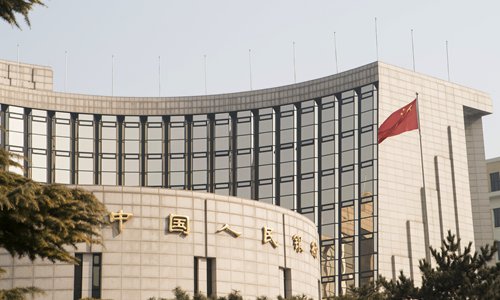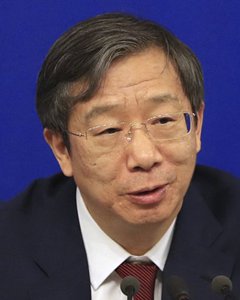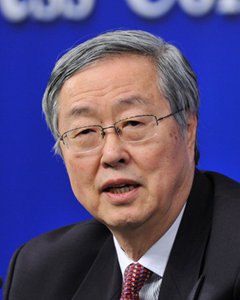
File Photo: VCG

Yi Gang File photo: IC

Zhou Xiaochuan File photo: IC
Yi Gang was endorsed as head of the People's Bank of China (PBC), the country's central bank, by the central government on Monday.
Yi replaces Zhou Xiaochuan, who had been the PBC's governor since 2002. Yi had been vice governor of the PBC since late 2007.
Yi said on Monday that his major task is to implement a stable monetary policy as well as to promote the reform and opening-up of the financial sector, thepaper.cn reported on Monday.
Cheng Shi, head of ICBC International Research, told the Global Times on Monday that with Yi Gang's solid academic background and ample practical experience, the PBC will maintain continuity and stability, and will conduct "fine-tuning" with "appropriate strength and at appropriate times."
Dong Dengxin, director of the Financial Securities Institute at the Wuhan University of Science and Technology, predicted that the transition of the PBC's governors would be "smooth," based on Yi Gang's recent public speeches.
"On the whole, the PBC's policy logic will meet the needs of China's economic situation instead of having too much personal color," Dong told the Global Times on Monday.
In previous speeches, Yi has repeatedly stressed the importance of supporting the real economy with financial policies. According to this year's Government Work Report, China's monetary policy will remain neutral in 2018, with easing or tightening only when appropriate.
In an article published on the PBC website on March 9, Yi was quoted as saying that the criterion for deciding if monetary policy is appropriate is whether China's real economy is being effectively supported.
Challenges ahead
But Dong also noted that Yi is taking the top job at a time when China's capital supply is tightening, which means that the PBC might need to shift its policy in the future with challenges to overcome.
China's M2, a broad measure of money supply that covers cash in circulation and all deposits, rose by 8.8 percent by the end of February, compared with a rise of 11.1 percent in the same period last year, data from the PBC showed.
According to Dong, China's money supply has been relatively loose in the past in accordance with the country's rapid economic growth. This has led to problems like surging financial leverage and overheated equity speculation.
"Now that economic development is shifting to a high-quality pattern, the country's money supply is also easing back. This is like a 'new situation' in China's financial sector, and how to deal with this situation will be challenging for the PBC and its new governor," Dong said.
Valuable experience
Experts also noted that the PBC has the competence to deal with potential risks, having had experience of tackling financial fluctuations in the past.
According to Cheng of ICBC International Research, when Zhou was the PBC's governor, the bank's policy tone was focused on maintaining stability and systematically pushing China's financial sector by improving policy foresight as well as synchronizing monetary policy with the real economy.
Cheng cited several examples of how the PBC had dealt with difficult situations during Zhou's leadership.
"Between 2002 and 2007, the PBC launched interest rate and exchange rate reforms to cool down the overheating economic development while also allowing China to benefit from the economic bonus of its accession to the WTO," he said.
Also, "between 2008 and 2012, the PBC repeatedly lowered the benchmark interest rate and the reserve requirement ratio to offset the negative impact from the global financial crisis. From 2013 up to now, the PBC has launched financial deleveraging to redirect capital from speculation to the real economy," Cheng noted.
But Dong cautioned that the leverage risks of recent years have not totally disappeared.
"If the PBC relaxes its grip, the bubbles might come back," he said, adding that he hoped the PBC would use monetary policy tools in the future to direct the market, similar to its use of options like the medium-term lending facility.

